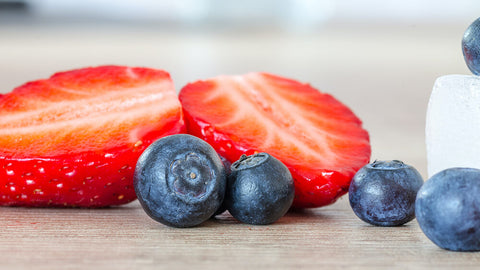Hi everyone, I hope you are staying healthy!
If one lesson is clear from the global situation during the past year, it is that it is time to take our health and the health of our planet seriously like never before. There's no planet B, and there is nothing more important than protecting the environment along with human and animal health. Keeping our most important natural resources - air, water, and soil - clean and free of pollution and toxins, as well as halting the effects of climate change, has never been more important. Here at HowCork, we have always made sustainability, our health, and the wellbeing of our planet a priority. It's the reason why we do what we do.
I usually don't talk about my educational background here, but I've decided in light of what is happening in the world right now to share more about what I studied during my time at university. Before creating HowCork, I completed my bachelor's degree in Nutrition and Culinary Arts at Johnson & Wales University in Providence, Rhode Island. This entailed many courses in chemistry, biology, dietetics, nutrition, and microbiology, as well as culinary arts. I have also been an avid student of natural medicine and a promoter of following a plant-based diet for as long as I can remember. This is what led me into the world of sustainable fashion, as plant-based eating habits and plant-based fashion go hand in hand. It all comes back to choosing plants over petroleum and respecting animal lives and the environment.
In the following article, I have compiled some tips to help everyone stay healthy and thriving.

1. Eat LOTS of fruits and vegetables
The single most important aspect of maintaining our health is fortifying a strong immune system. And nothing could be more crucial in maintaining our immune system at its best than eating a healthy, balanced, and plant-based diet. What we eat directly affects the types of bacteria that live in our gut and the level of acidity or alkalinity of our cells.
The point is this: a diet high in fresh fruits and vegetables creates an alkaline environment on a cellular level, which plays a large role in the prevention of all types of diseases. As soon as our cells become acidic, they stop functioning "aerobically" (that is, they stop the normal processing of glucose to create energy using oxygen) and begin functioning "anaerobically," which means that rather than using oxygen and glucose to produce energy, the cell begins to ferment and produce acids to create energy. This paves the way for all types of diseases to take root in the body.
What's more, eating animal fat (such as butter and lard) and chemically-altered vegetable oils such as hydrogenated or partially-hydrogenated oils creates an atmosphere in which fat cells become dysfunctional and insulin resistant. Toxic chemicals are also stored in our fat cells and lead to cellular dysfunction, including pesticides, cleaning products, and petrochemicals in general. This is because all of these chemicals are fat-soluble and therefore are stored in our fat cells along with fat itself.
Once fat cells become dysfunctional, they are unable to continue to store fat due to improper cellular signaling and become insulin-resistant. This displaced fat that can no longer be properly stored in fat cells is therefore sent instead to other insulin-receptive cells such as muscle cells and liver cells. This is the precursor to both type 2 diabetes and cardiovascular disease.
So what does this have to do with our immune response? When we consume animal fat, toxic preservatives, or expose ourselves to other hazardous chemicals, we start a cytokine (a type of inflammatory cellular signaler) reaction in our bodies, stemming from fat cells (the cellular signaling mentioned above). Fat cells are not just sitting there dormant in our bodies, but they have a huge effect on our immune response via cytokines and other types of inflammatory signalers.
The take-home message is simple. The more we eat animal products and processed chemical-filled foods, the more we create acidic conditions in our cells and the more we create an inflammatory immune response on a systemic level stemming largely from our fat cells. This lowers our immune system's potential to respond to threats.
I did a thorough research project on this subject and presented my findings at the Academic Symposium of 2014 at Johnson & Wales University. My research project was one of the few selected to be presented at this event. Here is a video of the entire speech (excuse the low-quality of the video) if you would like to have a watch.
The conclusion of my research is clear - a plant-based, "whole food" diet protects against disease and strengthens the immune system, as well as fortifies our gut health due to creating an environment of synergy with beneficial bacteria. Fruits and vegetables contain important micronutrients including vitamins, minerals, phytochemicals, and live enzymes that allow our bodies to function to their greatest potential and ward off bacteria, mold, and viruses.
Often people only think about macronutrients and calories, that is, protein, fat, and carbohydrates. But micronutrients play an often overlooked role in reaching optimal health. As Dr. Joel Fuhrman explains, Health = Micronutrients/Calories, meaning that in his words, "your long-term health is predicted by your nutrient intake per calorie eaten." It's not just a question of "calories in, calories out." The more micronutrients you eat in a day, the more your general state of health will improve. The key is to eat foods with a high micronutrient to calorie ratio, such as dark leafy greens and fruits.
Some of the most beneficial fruits and vegetables to consume are:
- Dark leafy greens including kale, spinach, swiss chard, bok choy, collard greens
- Cabbage, broccoli, Brussels sprouts, and other cruciferous vegetables
- Lettuce, arugula, and other salad greens and microgreens
- Tomatoes, peppers, eggplant, potatoes
- Zucchini, cucumber, melon, carrots
- Strawberries, blueberries, raspberries, blackberries
- Kiwi, banana, apples, pomegranate
- Oranges, lemons, limes, grapefruit
- Avocado, sweet potatoes, corn
- Olives, flax, coconut
- Garlic, ginger, quality maple syrup
- All nuts including but not limited to almonds, peanuts, walnuts, and cashews
Again, ALL fruits and vegetables are beneficial to our health, not just the ones on this list!
I also recommend avoiding GMO foods at all costs. Keep in mind that GMOs are banned in most of Europe. Additionally, I suggest avoiding foods containing chemical preservatives, refined white sugar and flour, and hydrogenated oils. Many preservatives used in the United States are also illegal in the European Union along with GMOs. If you can, buy organic whenever possible or grow your food at home using natural techniques to avoid pests. Pesticides are incredibly dangerous toxic war chemicals (developed during WW2 for chemical warfare and then brought home for domestic use after the war), and it is an investment in our long term health to avoid them as much as we can.

2. Consume enough vitamin C
This goes hand in hand with the previous section, but I wanted to elaborate a little bit on what is so important about vitamin C. Vitamin C is found in citrus fruits such as oranges and lemons, as well as other fruits such as strawberries and kiwi, and vegetables including bell peppers, spinach, broccoli, and kale. It is vitally important to strengthening our immune function. Citrus fruits are one of nature's most potent antibiotics (along with garlic, apple cider vinegar, and herbs such as oregano).
Vitamin C is a water-soluble vitamin that the human body does not naturally produce, and therefore we need to consume it daily. It is considered a powerful antioxidant that can strengthen your immune system and natural defenses. It fights against free radicals in the body and can raise the levels of protective antioxidants in the blood by up to 30%.
Vitamin C has been shown to lower blood pressure, reduce the uric acid content in the blood, prevent heart disease, help prevent iron deficiency (especially from plant-based non-heme iron sources), protect against dementia, and as mentioned above, boost immunity. Vitamin C also plays an important role in the proper metabolism of many substances in the body, including the activation of the B vitamin folic acid, the conversion of cholesterol to bile acids and the conversion of the amino acid tryptophan to the neurotransmitter serotonin.
So how exactly does vitamin C boost immunity? Vitamin C, along with other micronutrients, helps in preventing and reversing damage caused by free radicals at the cellular level. It also supports antibacterial activity and reduces the production of proinflammatory signalers known as cytokines.
Therefore, vitamin C plays a diverse role as both an antioxidant and an antibacterial substance to protect immune cells during an inflammatory response, for example to bacteria, viruses, or toxins.
Should you take a vitamin C supplement or eat foods containing naturally occurring vitamin C? While a supplement is certainly better than nothing at all, it is preferable to get vitamin C from food. According to Dr. Bistrian of Harvard Health Publishing, "It's better to get vitamin C from food because you also get other important nutrients. Eat the recommended five servings of fruits and vegetables per day for general health, and you'll get enough vitamin C."
I recommend drinking fresh citrus juice once a day - that is freshly juiced, not pasteurized orange juice from a bottle, which does not contain the same live enzymes and nutritional value as fresh-squeezed juice. This does not mean that you need to go out and buy an expensive juicer. Just a simple manual citrus juicer and a little elbow grease will do the trick!

3. Get enough sunlight exposure
Spending time in the sun is incredibly important for our physical and mental wellbeing. Sun exposure allows our bodies to naturally produce vitamin D, which is extremely important for strengthening our immune system and avoiding illness. Lack of sun exposure is part of the reason why the flu and other illnesses proliferate in the winter more so than in the summer.
How exactly does our skin produce vitamin D from sun exposure? When our skin is exposed to the sun's rays, it synthesizes vitamin D3 from the cholesterol present in our skin cells. When the sun's ultraviolet B (UVB) rays hit cholesterol in the skin cells, it provides the energy for vitamin D synthesis to occur.
The sun is our best source of vitamin D, and even spending just a short time in the sun a day can allow us to meet our needs for vitamin D. Even just 15 minutes in the sun can be enough for someone with pale skin, whereas a couple of hours can be enough for someone with darker skin. This difference is due to melanin levels in the skin (the more melanin you have, the darker your skin tone), which protects the skin from UVB rays. You don't need to "get a tan" or burn your skin (which obviously can have negative health effects) to get enough vitamin D from the sun. The more skin exposed to the sun, the more vitamin D your body will produce. The key to remember is that frequent and moderate exposure to the sun is health-promoting, whereas overexposure can be dangerous. The current advice is for people to stay in the sun for half as long as it takes their particular skin type to burn, as this should allow them to produce the vitamin D that they need to stay healthy without increasing the risk of developing skin cancer. Keep in mind that you need to have direct exposure to the sun to allow the skin to produce vitamin D - that is, sun exposure through a closed glass window will not allow your skin to produce vitamin D, as the glass blocks the sun's UVB rays from reaching your skin. Sunscreen also prevents the skin from creating vitamin D.
It is recommended to expose your skin to the sun around noon (or within the time frame of 11 am to 2 pm), as studies show that the body is most efficient at producing vitamin D around this time. At this time of day, the sun's UVB rays are most intense, so you need less time in the sun, decreasing your risk of burning your skin during sun exposure.

4. Practice grounding
You may be wondering just what "grounding" actually means. Well, it is just the simple act of placing our feet directly on the earth outdoors. Also known as "earthing," it just requires us to be in direct contact with the earth's surface. Our bodies are both electrical and chemical - it is electrical impulses that allow our nervous system and neurotransmitters to function.
The earth is also electromagnetic, with a current that flows through the planet referred to as Schumann Resonance. The process of grounding connects our bodies directly with the electrical energy of the earth through the bottom of our feet, much in the same way that we absorb Vitamin D from the sun through our skin.
There are many known benefits to grounding, such as reducing cortisol levels (a cause of inflammation), improving circulation, reducing muscle damage after exercise and mood improvement. But most importantly, it works against positively-charged free radicals in our bodies, which are reactive oxygen species that have lost the proper balance of electrons and become unstable. These free-radicals cause inflammation in our bodies as well as a toxic assault on our cells. Grounding can also counter the harmful effects of EMF (electromagnetic field) radiation, which creates positively-charged ions leading to the creation of these free radicals.
If this sounds like "hippy" thinking to you, have a look at this article from the Journal of Environmental and Public Health entitled "Earthing: Health Implications of Reconnecting the Human Body to the Earth's Surface Electrons," which states in the abstract:
"Emerging scientific research has revealed a surprisingly positive and overlooked environmental factor on health: direct physical contact with the vast supply of electrons on the surface of the Earth. Modern lifestyle separates humans from such contact. The research suggests that this disconnect may be a major contributor to physiological dysfunction and unwellness. Reconnection with the Earth's electrons has been found to promote intriguing physiological changes and subjective reports of well-being. Earthing (or grounding) refers to the discovery of benefits—including better sleep and reduced pain—from walking barefoot outside ... connected to conductive systems that transfer the Earth's electrons from the ground into the body."
The idea of grounding is established science, and it is only gaining more traction and garnering more awareness as time goes on!

5. Think positive thoughts and practice gratitude to reduce stress
Our thoughts have a direct effect on our mental and physical health. The mind-body connection is stronger than we may think, hence why the placebo effect exists, or why we can speed up our heart rate and flow of adrenaline just by thinking worrisome or exciting thoughts. Fear can weaken our immune system whereas positive thoughts can help us get through difficult times and help keep our minds and bodies strong.
Gratitude is one of the most important ways that we can deal with tough times. Reminding ourselves of all the things we have to be grateful for helps us to look past a negative turn of events and stay on a path toward our most profound goals, as well as reduce stress and anxiety.
Here are some positive affirmations that we can say to ourselves daily, especially in times like these. I have taken these affirmations from Gansos Salvajes, a Spanish magazine that focuses on sustainable fashion and self-esteem. Translated from the original Spanish:
- I am capable of facing and dealing with this or any situation
- I have the resources that I need in each and every moment
- My future is happy, luminous, and safe
- Everything that happens is for my benefit
- Life takes care of me
- The number of capabilities and talents that I am developing surprises me
- Inside of me is the intelligence of nature and I can always connect with it to know how what to do
- I am safe and healthy
- This is an opportunity for my growth
- I always receive the help that I need
- I am grateful for all of the good that there is in my life

6. Exercise daily
Partaking in regular exercise is one of the most important things that we can do to protect our health. Exercise and diet go hand in hand towards living a healthy lifestyle, and they have an equally important role to play. Obesity is one of the leading causes of cardiovascular diseases (hypertension, heart disease, and type 2 diabetes). As explained above, this is largely due to eating animal fats (including butter) which contain saturated fats that lead to the production of LDL cholesterol in our bodies, leading to vascular plaque and fat cell dysfunction. Exercise is vital to creating movement inside of our bodies that break down these fats, sending oxygen into our cells, and aiding in muscle development which increases our body's resting metabolic rate and ability to rid itself of toxins.
According to a peer-reviewed article by Yati N. Boutcher entitled Exercise is Medicine: The Importance of Exercise as Preventative Medicine for a Disease‐Free Lifestyle, exercise is a "powerful stimulus" which can reduce or reverse the effects of diseases such as chronic heart failure, coronary heart disease, dyslipidemia, hypertension, insulin resistance, intermittent claudication, obesity, and type 2 diabetes. The effects of exercise on these conditions are considered "similar to many drug therapies" - where these drug therapies come with many adverse side effects, but exercise poses no risk of negative effects on our health. For those of us who are already healthy, exercise still presents numerous health benefits, such as improvement in balance, cognitive functioning, life expectancy, and overall quality of life.
This is why exercise is always important to reduce the harmful effect on our health of a sedentary lifestyle and for improving or maintaining our health. Exercise truly is preventative and restorative natural medicine!

7. Opt for alcohol or soap and water to disinfect rather than chlorine bleach if possible
Think toxic chemical cleaners are harmless? Think again. Toxic chemicals found in cleaning products can pose enormous health risks when inhaled or absorbed into the skin, and can also put our children and four-legged friends at risk. In these days of increased attention to hygiene and cleanliness, let us not forget that toxic chemical products reduce the ability of our bodies to ward off illness. Although chlorine bleach (common household bleach) is one of the recommended ways to disinfect against coronavirus, it can also pose great health risks to humans and animals. I'm not saying to forgo the use of bleach if it is the only option available to you during this time of crisis (please protect yourselves with gloves and a mask and work in a well-ventilated area if you absolutely must use bleach). But, health authorities clearly state that ethyl or isopropyl alcohol is just as effective at killing the virus on surfaces as bleach. This is also true for soap and water.
Alcohol or soap and water are much safer options for cleaning as they do not pose the same respiratory risks as bleach, and are equally effective. According to Richard Sachleben, an organic chemist and member of the American Chemical Society, just the friction from scrubbing with soap and water can break the coronavirus’s protective envelope. “Scrub like you’ve got sticky stuff on the surface and you really need to get it off,” he says. Alcohol solutions containing 70% alcohol are also effective against coronavirus on hard surfaces.
So what are the risks of using chlorine bleach?
According to the California Department of Pesticide Regulation, research shows that exposure to bleach not only can make asthma worse in those who already are afflicted with this condition, but that workers who are exposed to bleach can actually develop new asthma from exposure to bleach over time. In 2012, the Association of Occupational and Environmental Clinics named bleach an "asthmagen," which means it can cause asthma, not just trigger an asthma attack in someone who is already asthmatic. Furthermore, children are at greater risk when inhaling bleach vapors because their lungs are still developing.
Bleach is a known irritant to the skin, mouth, and eyes, as well as to the lungs. Why would we want to disinfect (especially when COVID-19 especially attacks the lungs) with a chemical product known to cause irritation and damage to the lungs? Especially when there are much safer options readily available that are equally effective?
What's more, the disposal of bleach also has harmful consequences for the environment. Bleach disposal produces dioxin due to containing chlorine (sodium hypochlorite, the active ingredient in bleach, is derived from chlorine). Often, manufacturers of bleach and bleach products release bleach-containing waste into bodies of water. Bleach reacts with other chemicals in the water to form even more harmful substances, including (but not limited to) dioxins. Dioxin is a chemical that is considered one of the absolute most toxic substances known to science. Bleach also puts wildlife at risk, as environmental toxins caused by bleach being released into waterways have lowered the populations of several species of birds and fish.

8. Incorporate herbs and spices in the diet
It is well established that culinary herbs and spices provide numerous health benefits. "Spices are concentrated sources of antioxidants,” says Diane Vizthum, a research nutritionist for the Johns Hopkins University School of Medicine. Spices and herbs not only add additional flavor to our meals but also are a great source of antioxidants, micronutrients, and anti-inflammatory plant substances.
One of the most important spices to incorporate in our diet is turmeric. It is an anti-inflammatory spice, aiding in the prevention and reversal of arthritis and brain inflammation, as well as possible anti-cancer effects. It can be added to almost any dish, especially Indian-style curries.
Cayenne pepper is also a potent anti-inflammatory culinary spice. Due to its active molecule called capsaicin, cayenne pepper is not only a topically used anti-inflammatory but can reduce internal inflammation as well. It also has anti-bacterial properties that fight against the bacteria that cause stomach ulcers in particular.
All culinary spices have a range of diverse health benefits, including black pepper, cinnamon, cumin, coriander, cardamom, and cloves, as well as ginger and garlic (somewhat of a mix between vegetables and spices). There is now ample evidence that spices and herbs possess antioxidant, anti-inflammatory, anticarcinogenic, and glucose- and cholesterol-lowering activities as well as properties that affect cognition and mood.
All culinary herbs also provide a tasty as well as anti-inflammatory and anti-bacterial addition to our food. Mint, basil, parsley, cilantro, sage, rosemary, thyme, and oregano, to name some of the most commonly used culinary herbs, all have a place in our kitchen. Using herbs to add an extra touch to our favorite dishes is a win-win situation, as it makes our dishes look more inviting and professional, elevates the flavor profile of our food, and provides a long list of health benefits.
Tea, especially green tea, as well as herbal teas such as chamomile also provide benefits for our overall health and immune system. Keep in mind that green tea is a slight stimulant due to containing low levels of caffeine, and chamomile tea might make you feel a bit sleepy.

9. Get enough sleep
Sleep is our body's natural restoration system. Adults need 8 hours of sleep every night for our bodies to be able to stay healthy over the long term and keep our immune system in pristine condition.
As reported in an article by Medical News Today on the importance of sleep, a study in the World Journal of Gastroenterology suggests that there is a link between sleep deprivation and inflammatory bowel diseases, in which sleep deprivation leads to inflammatory bowel diseases and then, in turn, the presence of these bowel diseases makes it difficult to sleep. These diseases affect the gastrointestinal tract, which plays a large role in our immune system response and the type of bacteria that flourish in our gut.
The same article continues to explain how getting enough sleep helps us build a stronger immune system. Sleep helps the body to repair and regenerate on a cellular level. The immune system is especially revitalized during our hours of sleep. Although the exact mechanisms are not well understood, there is research being carried out that shows that increased quality of our sleep can help the body fight off infection. It is advised not to eat too soon before going to sleep because this prolongs the process of digestion, and the body should not be digesting food during sleep so that it can fully enter into the restorative processes of the immune system.
Sleep has also been shown in research studies to be essential to our ability to both learn new information and use our memories to the fullest potential to access stored information.
A sleep-deprived person has difficulty focusing attention to the same extent that they would be able to when fully rested. In this state, it becomes harder to assimilate new information. What's more, sleep itself plays a role in the consolidation of memory. Some research suggests that that memory consolidation takes place during sleep, and although much remains to be understood about this process, many believe that the various cycles of brainwaves during different stages of sleep play a role in the formation of long-term memory.
Getting enough sleep becomes especially important when we need to be even more alert than normal in these times of COVID-19. We need to be able to quickly resolve problems that may present themselves in the home and be able to think on our toes. For example, we may look in the refrigerator and pantry and panic thinking that there is nothing left to eat. But a well-rested mind, rather than beginning to race, can think more creatively to concoct meals from what is on hand. Staying clear-minded is also important to not let feelings of fear and anxiety overtake us during this period where watching the news can send us into emotional overload. Not getting enough sleep can lead to overly emotional reactions even during the best of times, and during these difficult times, it is more important than ever to remain level-headed and not let our emotions get the best of us.
Sleep is also important to maintaining high energy levels, which are necessary to accomplish our day-to-day tasks such as work, cooking, cleaning, and tending to children and animals, all with a smile on our face and positive energy! Productivity is heightened in all respects when we are well-rested, as well as our concentration and emotional reasoning and empathy.
------------------------------------------------------------------------------------
There you have it! These are my top 9 bits of natural health advice to keep in mind at all times! These tips are both preventative and restorative, to help maintain a state of constant health. Let us know if you have anything to add in the comments below!



1 comment
I totally enjoyed reading this blog. I feel pretty good that my lifestyle includes much of what was mentioned here. I can definitely use more sleep, but that’s something I’m working on. I love how vegetables, fruits, spices and herbs are mentioned. I think I have every spice mentioned!
Anyway, thank you for this terrific blog. It’s nice to know others share my type of lifestyle. Most of my friends don’t practice many of the things mentioned and I get teased about how I eat salad everyday. That still doesn’t stop me!
Thanks again!
Elaine